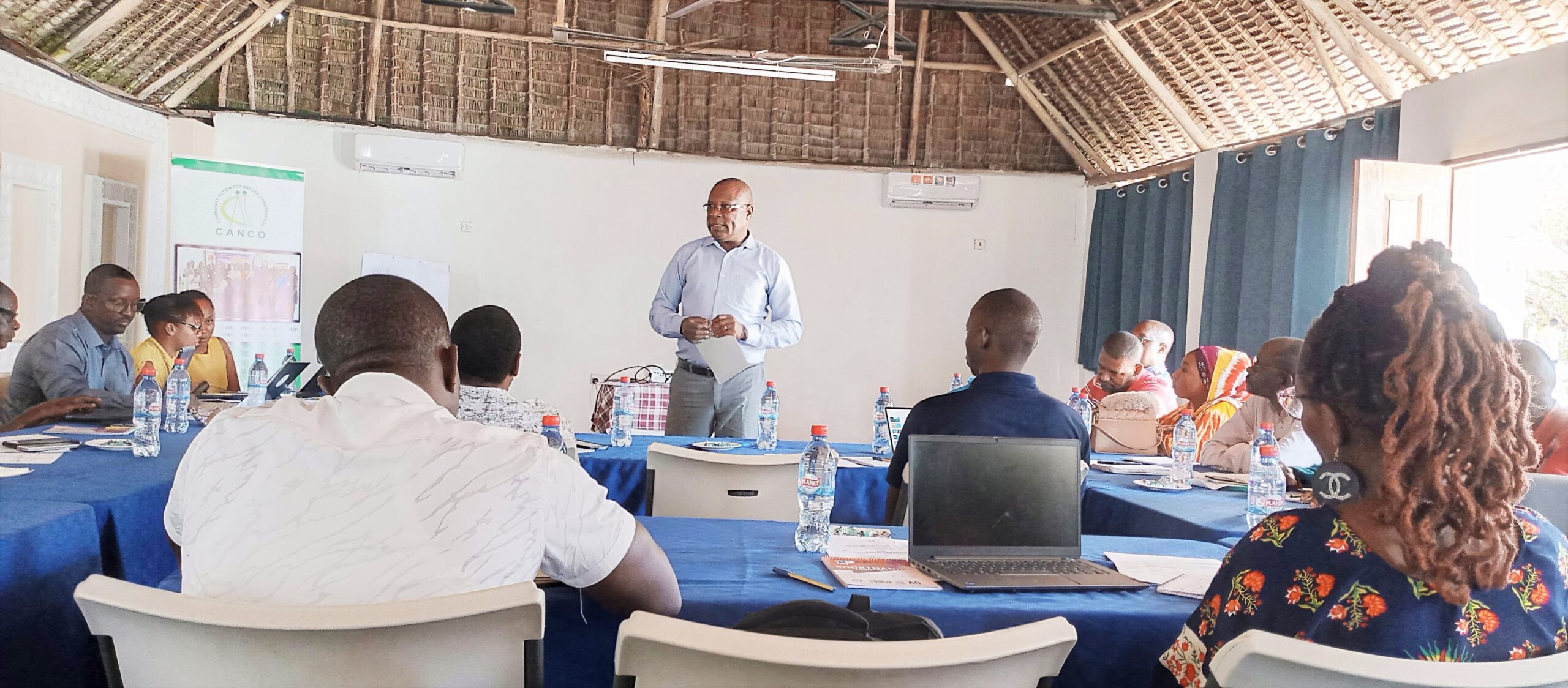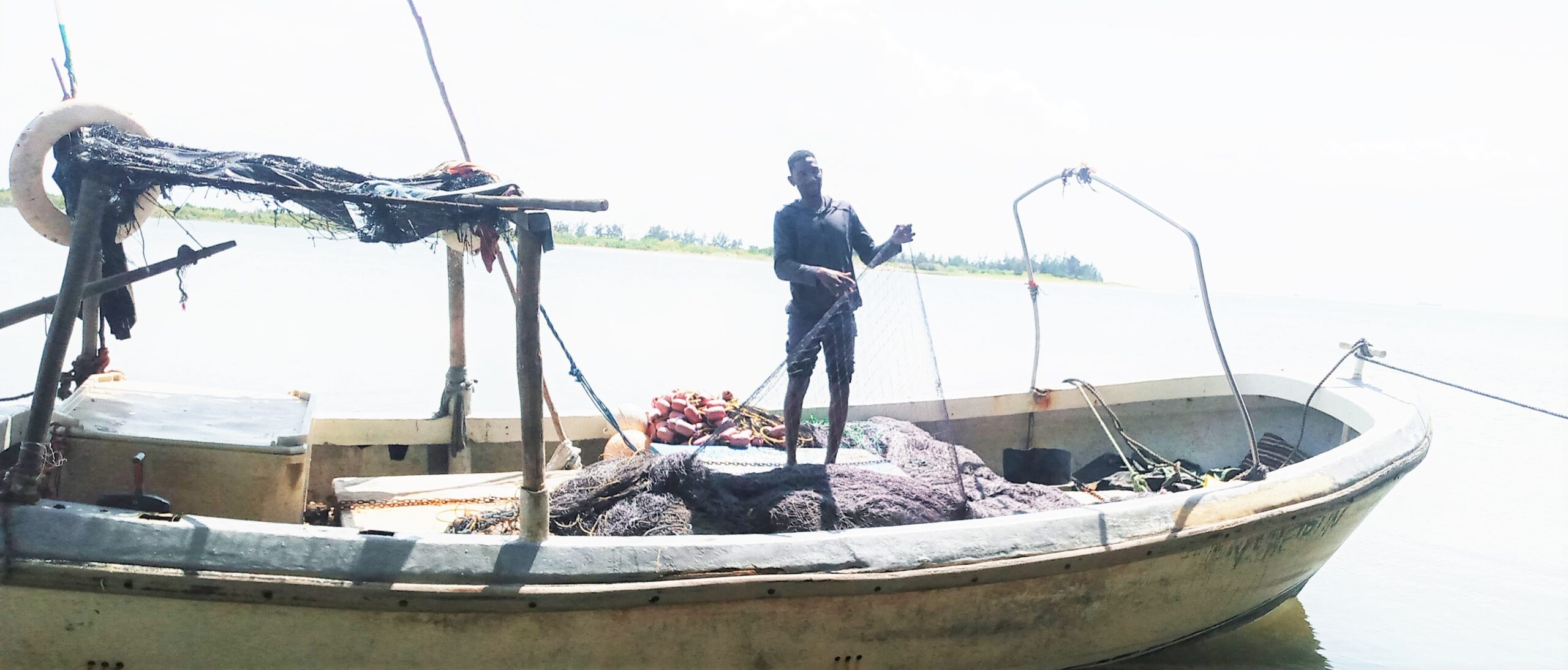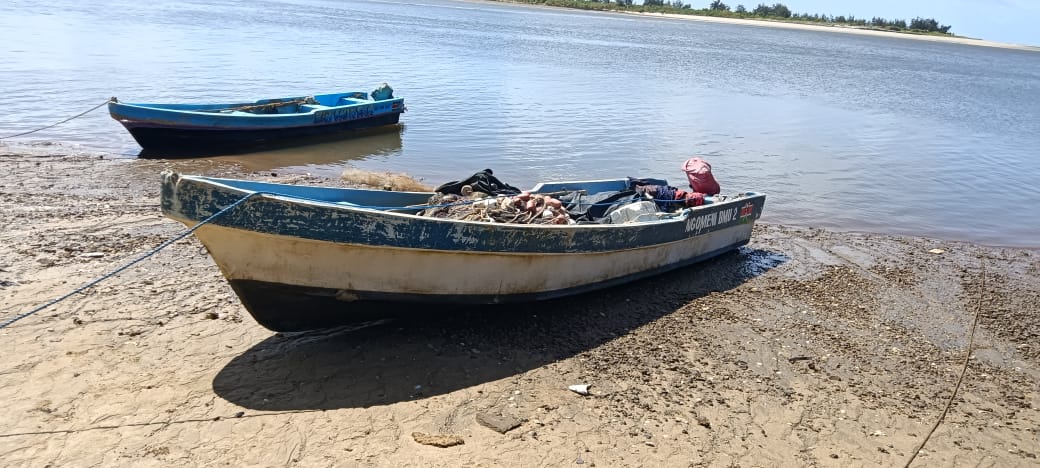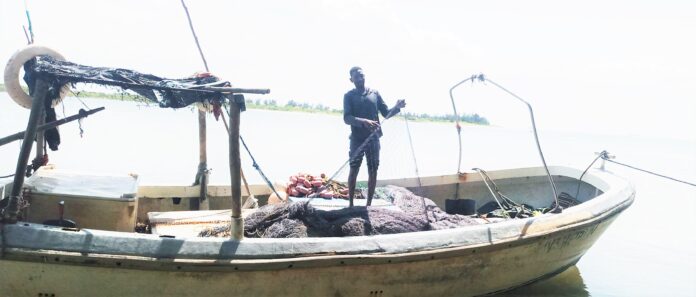By Mazera Ndurya
Mombasa County, Kenya: They form the majority of the fisher folk operating in the Indian Ocean from Vanga on the South Coast to Kiunga, Lamu on the north coast of Kenya providing over 80 percent of household incomes but they lack title deeds for their fish landing sites.
In the changing global weather patterns occasioned by climate change, small-scale fishers bear the brunt of the vagaries of weather due to dwindling stocks. They weather the storms in the sea risking their lives but in the end carry little catch because they operate with rudimentary fishing gear.
At a recent knowledge-sharing workshop on small-scale marine fisheries governance, nothing short of a deliberate governmental and non-governmental intervention is required to boost the capacities of this group to realize their full potential and to be able to fully harness the massive marine resource.

The meeting organized by Community Action for Nature Conservation (CANCO), and brought together government and civil society organizations provided the platform for experience sharing and opportunities for implementing a five-point call to action from small-scale fishers.
According to the Food and Agriculture Organization (FAO) Voluntary Guidelines to Secure Small-Scale Fisheries (VGSSF), small-scale fisheries encompass all activities along the value chain- pre-harvest, harvest, and post-harvest.
The VGSSF was approved as an international instrument in June 2014. These guidelines were created as a result of a very long history of the struggles of small-scale fish workers around the world appealing for greater recognition of their rights and their roles in the fisheries sector of their countries.

CANCO Executive Director Hadley Becha said the call to action was mooted during the 2022 International Year of Artisanal Fishers celebrated in South Africa while in Kenya it was a follow-up of the World Fisheries Day marked in Shimoni, Kwale County.
“Collective action is better to realize the goals and address the gaps that exist. The call to action also brings out opportunities for women and how they are organized on issues of securing their space in the blue economy as clearly stipulated in the Sustainable Development Goals (SDGs) number 14 (b) which calls on states to secure access to marine resources and markets for small scale fisheries.
“If we have to secure places of the small-scale fishers they have to be part of the policy-making and decision-making process at all levels,” Becha said.
All the signatories supporting the call to action are organizations representing small-scale fisheries around the globe including from Africa (CAOPA, CANCO), the Pacific (LMMA), South (CONAPACH), and Central America (RAMPR), and Europe (LIFE, Aktea).
The call to action stipulates: “Action is urgently required to address the following key challenges to ensure that small-scale fisheries are protected and restored and that they continue contributing to economies, health, culture, and wellbeing.”
To actualize this, by 2030 governments must:
Urgently secure preferential access and co-manage 100percent of coastal areas
SSF tenure rights and access to fishing resources must be protected; SSF women and men must participate effectively in the decisions that affect them.
Guarantee the participation of women and support their role in innovation
Women are present at all stages of SSF value chains and are the essential link in getting the fish to the consumers. But their work is unrecognized; their contribution, including innovations, is not valued and their working and living conditions are dire.
Protect SSF from competing blue economy sectors
The negative impacts of more powerful sea and land-based sectors (offshore energy production, deep-sea mining, industrial fishing, tourism, fishmeal factories, logging) jeopardize the future of coastal communities. The precautionary approach and effective participation of SSF should guide any new ocean use.
Be transparent and accountable in fisheries management
Political will is needed to urgently reform fisheries policies and practices that will ensure healthy coastal communities and benefit national economies.
Build resilient communities to face climate change and offer prospects to youth
SSF are the first to suffer the impacts of climate change and other external shocks, and this affects their future. Fisheries governance must include access to social rights and guarantee decent fishery-dependent livelihoods for youth
One of the key recommendations that needs to be addressed is the aspect of women in fisheries – demystifying fisheries as a male thing and giving women opportunities in the sector.
Mwatime Mohamed-Kwale – Kwale Women in Small Scale Fisheries says women who venture into the fisheries space are still not getting much attention in terms of support for empowerment.
“Traditionally, fishing is a preserve for men and that I believe is why all the support in fisheries is male-oriented. The women can also go to the deep sea and bring fish and not just wait by the beach to buy from fishermen,” she said.
Although the fishers are questioning some of the interventions taken by both the national and county governments, Kwale County Executive Committee (CEC) Member for Agriculture, Livestock, and Fisheries Roman Shera said the county government is a partner in pushing for the agenda of the small scale fishers.
“About 99 percent of the fishermen in the county are small-scale fishers. As a country, we are passionate about fishing because it is one of the economic mainstays here. In the 10 years of devolution, the county government has done a lot to enhance the capacity of fishermen.
“We have constructed fish landing sites in an effort to improve on fish quality while at the same time providing a number of Beach Management Units (BMUs) with fishing boats because we realized that most of them have no capacity to go beyond the reef,” he said.
Shera said the county government has given out a number of fishing gear such as nets; built two ice plants and built about 4 cold storage facilities to help reduce post-harvest losses.
He added; “The Go Blue project funded by the European Union (EU) has donated fishing boats to three BMUs’ and also put up a storage facility in Jimbo.”
The non-involvement of small fishers and even fishermen, in general, can be blamed for the provision of materials that do not meet the requirements of the fishers.
Harith Mohamed from Vanga Blue Forest and a fisherman while appreciating the boats that were donated for Beach Management Units (BMUs) were not fishing vessels but patrol boats.
“If we had been involved from the outset we would have clearly told them what type of boats we need for fishing,” said Harith.
Fisherman and official of Bodo Beach Management Unit (BMU) Harun Kondo aptly describes what the small-scale fishers go through to get fish to the market.
With a canoe, he certainly cannot go very far, especially around this time of the year when the sea becomes rough, which means he has to fish within the reef.
“But even with such a handicap, there are chances that the small catch could go to waste therefore we have to get to the beach early enough to get the women fish traders (Mama Karanga –the women who buy and fry fish for sale in the locality) to buy because there are no storage facilities at the fish landing site,” he said.

One good thing that Kondo cherishes the most is the fact that he owns the canoe, rudimentary as it is, he is able to determine where to sell and for how much and all the proceeds go to him.
One of the issues that came to the fore during the workshop is that most of the fishermen have no control over the catch they get because they are hired by the tycoons who own the fishing vessels.
“How can the small fishers get rich when they have no control of the resource that is within their reach?” said Harith.
In Ngomeni, Kilifi County, small fishers are grappling with very low incomes, disasters in the sea, run-ins with security agencies, and fighting for landing sites with land grabbers.
Saidi Mote, the Ngomeni Beach Management Unit (BMU) Chairman said being a small-scale fisherman is not easy especially when operating with limited resources.
“At times you may estimate that a fishing expedition would require about 60 liters of petrol to your regular fishing site only to find that there is nothing. Unlike modern fishing and bigger commercial vessels that can detect where there is abundant fish, our fishermen have to use trial and error and in doing so end up finishing the fuel deep in the ocean leaving them at the risk of being swept by strong waves.














